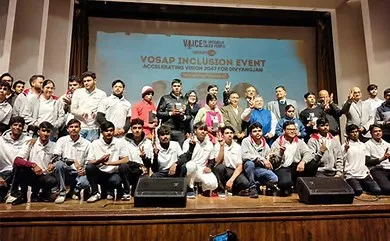The Voice of Specially Abled People (VOSAP) Foundation hosted a groundbreaking event in New Delhi, distributing AI-powered smart glasses to over 300 visually impaired students. This initiative, led by Pranav Desai, founder of the VOSAP Foundation and a prominent advocate for accessibility, aims to empower persons with disabilities through innovative technology.
Transforming Education and Independence
The AI-based smart glasses, equipped with advanced features, assist users in navigation, reading text, and recognizing objects and faces. Aditya, a postgraduate student from Delhi University, shared his excitement about the glasses:
“Academically, I often need assistance to locate my Aadhaar card or read documents. With this device, I can independently find and use my Aadhaar card or other documents with ease.”
Similarly, Ankita Gupta, another student, highlighted the benefits in education. “Many books are unavailable in braille. This device allows us to read printed books and documents effortlessly. It even makes railway journeys smoother,” she said.
Innovations by VOSAP and Other Contributors
Pranav Desai, a key figure behind the Accessible India Campaign initiated by Prime Minister Narendra Modi in 2015, has been instrumental in driving accessibility reforms. Over seven years, he has empowered over 30,000 individuals with disabilities across 24 Indian states. Speaking about the smart glasses, he said:
“This technology uses a camera to capture images, which are processed through software connected via Bluetooth. It can identify faces, read text in multiple languages, and assist with navigation. It’s just the beginning of a transformative journey for visually impaired individuals.”
Another noteworthy innovation presented at the event was Wheel Ease Solutions’ Clip Ease. Co-founder Taha Nafees explained, “This device converts a manual wheelchair into an electric-powered one within seconds, granting users greater independence and accessibility in daily life.”
A Vision for the Future
The event attracted visually impaired students from Delhi University, NGOs, and contributors dedicated to advancing technology for persons with disabilities. Pranav Desai’s ambitious vision includes achieving a $1 trillion economic contribution from the disability sector by 2047.
Such initiatives are paving the way for greater inclusion, enabling visually impaired individuals to fully participate in education, work, and society.























